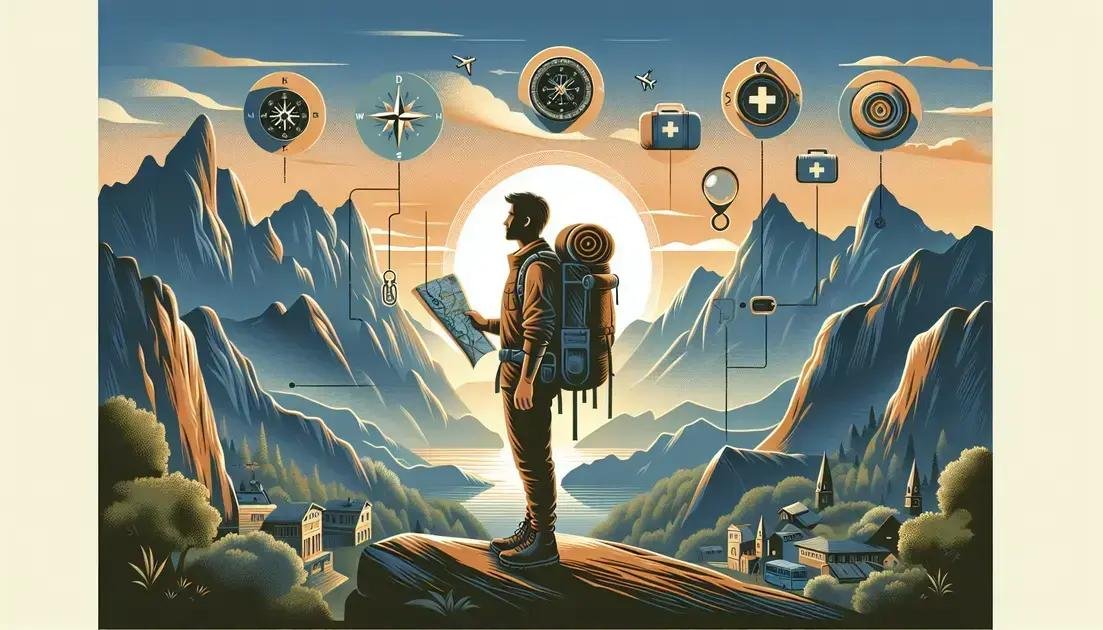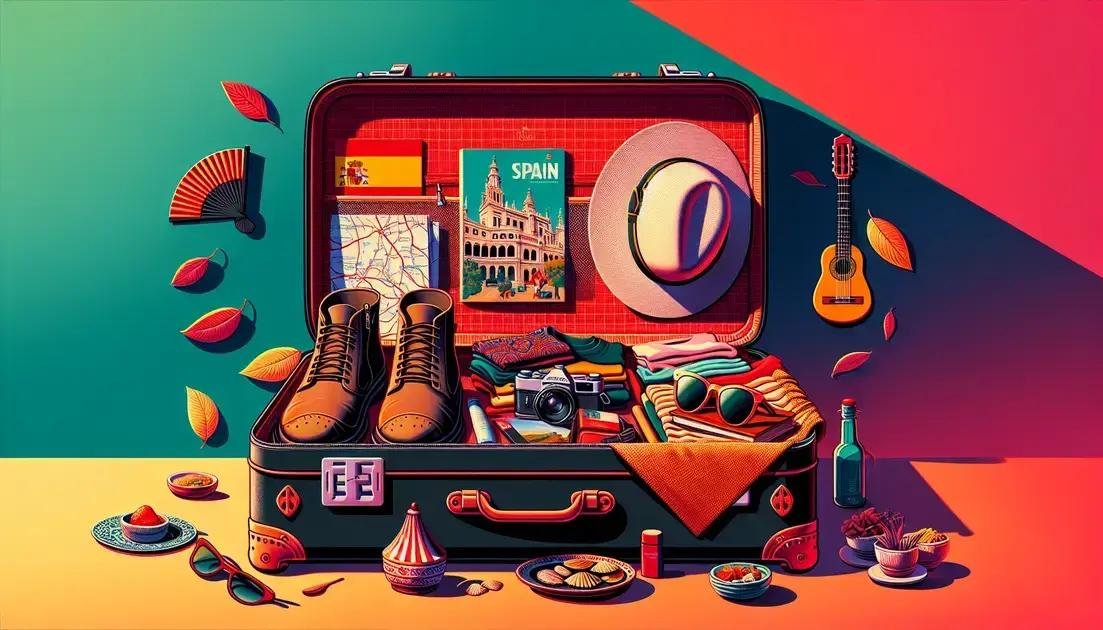
Is traveling to Spain solo on your mind? This guide delves into the exciting experiences awaiting solo adventurers in Spain while addressing key concerns about safety, cultural insights, and practical tips.
Whether you’re exploring vibrant cities or charming villages, we’ll help prepare you for a memorable trip, ensuring you feel confident and secure.
Dive into our comprehensive sections, keeping in mind strategies to connect safely with locals, manage travel emergencies, and immerse yourself in Spain’s rich cultural tapestry.
Understanding Travel Safety in Spain
When contemplating a solo trip to Spain, understanding the landscape of travel safety is a crucial step. This beautiful country, rich in culture and history, is generally safe for travelers who exercise common sense and vigilance. Petty crime, such as pickpocketing, can occur, especially in tourist-heavy areas like Barcelona and Madrid. To mitigate risks, it’s wise to keep a close eye on personal belongings, particularly in crowded spaces such as public transport and busy streets.
Beyond urban areas, many solo travelers find peace and tranquility in Spain’s countryside and smaller cities, where crime rates are typically lower. Still, it’s always beneficial to stay alert and informed. Checking out local news and updates on travel advisory sites before your journey can prepare you for any recent developments that might affect safety.
Language barriers might be a concern, though basic Spanish phrases can be tremendously helpful in navigating potential misunderstandings. Furthermore, many Spaniards speak English, particularly in more touristic areas, which eases communication considerably.
Another aspect of travel safety involves understanding local customs and laws. For example, Spain has specific regulations about drinking in public or smoking in certain areas, and adhering to these can prevent unnecessary confrontations with authorities.
Spain is well-regarded for its healthcare facilities, which are accessible even to travelers. Having proper travel insurance is advised to cover any unexpected medical expenses that might arise. Remember, a well-informed traveler is a safe traveler, and by staying updated and prepared, you can enjoy your solo journey in Spain with peace of mind.
Essential Tips for Solo Travelers

Traveling alone can be an incredibly rewarding experience, allowing for spontaneous adventures and personal growth. However, it comes with its own set of challenges, especially regarding safety and comfort. Be mindful of your surroundings at all times. In Spain, certain areas might be more crowded and require extra vigilance, such as tourist hotspots in major cities like Barcelona and Madrid.
An essential tip for solo travelers is to stay connected. Ensure your mobile phone is fully charged before heading out, and have a portable charger as a backup. Consider purchasing a local SIM card if you plan to stay for an extended period, as it will help you access maps and communicate with local services or people when needed.
Another important aspect of solo travel is blending in with the local culture. Respecting local customs and attire will not only make you less conspicuous but also enhance your interactions with locals. Learn a few basic phrases in Spanish; even a simple “Hola” (Hello) or “Gracias” (Thank you) can go a long way in building rapport.
Avoid sharing too much information about your travel plans with strangers. While it’s great to make new friends, be cautious about divulging details like where you’re staying or your schedule.
It’s also prudent to register with your country’s embassy or consulate when traveling abroad. This makes it easier for authorities to assist you in case of emergencies, such as natural disasters or unforeseen political events. Always keep a copy of your important documents, such as your passport and travel insurance, both digitally and physically.
Ultimately, solo travel in Spain can be safe and enjoyable if approached with the right mindset and proper preparation. Trust your instincts, prioritize safety, and savor the freedom to explore at your own pace. Delight in Spain’s vibrant culture, from the bustling markets to serene landscapes, knowing you’re well-prepared to handle any situation you might encounter alone.
Safe Destinations in Spain for Solo Tourists
Traveling alone to Spain offers an exciting opportunity to explore its diverse regions safely. Barcelona, for example, is known for its vibrant culture and bustling city life. With its wide streets and friendly locals, it ranks high among solo traveler destinations. Walking through Barrio Gótico or relaxing on Barceloneta Beach, solo tourists will find plenty to see and do.
Another safe haven, Seville, enchants visitors with its historical architecture and warm, welcoming atmosphere. The city is well lit and well populated, making it a comfortable environment for solo explorers. Visit the Seville Cathedral or stroll through the lush Parque de María Luisa for a peaceful afternoon.
In the Basque Country, San Sebastián is famous for its beaches and culinary delights. It’s a secure spot where tourists can visit vibrant markets and dine solo at Pintxo bars, sampling delightful local flavors while feeling safe and connected to the community.
Granada offers a charming blend of cultures and a laid-back atmosphere. The stunning Alhambra palace and vibrant street life offer a unique experience for any solo traveler. Walking through the Albaicín neighborhood will reveal breathtaking views and traditional souks to explore.
For those who love a mix of tradition and innovation, Valencia combines old-world charm with new-age vibrancy. The city is known for its safety and is perfect for enjoying the futuristic architecture of Ciudad de las Artes y las Ciencias or relaxing in the sprawling parks and gardens.
Packing Smart for Your Spain Adventure

Packing efficiently for your Spanish escapade means knowing what to carry to ensure safety and convenience. When traveling solo, it’s advisable to pack lightweight and versatile clothing. Spain’s climate can vary, so layers are key. Utilize a small travel backpack which can double as a daypack. An important tip is to keep essential documents, such as your passport and itinerary, readily accessible yet secure.
A money belt or hidden pouch can be a reliable way to safeguard your valuables, particularly in crowded places. Multi-purpose items like a scarf can serve numerous functions, from sun protection to a makeshift towel.
Selecting the right footwear
is crucial; a pair of comfortable and sturdy shoes can make all the difference during extensive walking tours or visits to historical sites.
When it comes to technology, a universal adapter and a portable power bank ensure that electronic devices stay charged. Reliable Internet access is important for staying connected, so consider purchasing a local SIM card or a portable Wi-Fi device. Don’t forget to include a small first aid kit to handle minor medical needs and a reusable water bottle to stay hydrated.
Finally, ensure all packed items comply with airline regulations, and check the weather forecast for your destinations in Spain to fine-tune your packing list accordingly. Efficient and thoughtful packing not only enhances your travel experience but also adds a layer of safety and preparedness essential for solo journeys.
Cultural Insights for Solo Travelers
Embark on a solo adventure through Spain and uncover the country’s rich cultural tapestry. Traveling solo allows for an immersive experience in the bustling streets of Barcelona, the historic sites of Madrid, or the vibrant festivals in Seville. Engage with local traditions, such as Spain’s famous afternoon siestas and evening tapas culture, to truly experience the Spanish way of life.
Understanding cultural nuances is key to blending effortlessly into Spanish society. Learn basic Spanish phrases to enhance interactions and show respect towards locals. Familiarize yourself with traditional greetings like the customary beso, a kiss on each cheek, which is a common friendly gesture.
Dress and Behavior
Respect local customs in attire, especially when visiting religious sites. Modest dress is often required, and it’s beneficial to check attire guidelines in advance. Spain is known for its lively and passionate demeanor, but maintaining a polite and friendly attitude will help in building positive connections.
Enjoying Local Events
Participating in local festivals offers a deeper dive into Spanish culture. Events like La Tomatina or Semana Santa provide a unique perspective on regional traditions and local enthusiasm. Engage with street performances or local culinary fairs to further your cultural immersion.
Being a solo traveler in Spain means having the freedom to create your own itinerary and pace, but it’s important to remain aware of cultural differences. Embrace the diversity of Spanish cities, towns, and regions, each offering its own distinct charm and experiences.
Navigating Public Transport Alone

Traveling around Spain independently offers the freedom to explore at your own pace. Public transport is widespread, efficient, and can be a great way to experience local life. When navigating public transport alone, it’s essential to stay aware of your surroundings and familiarize yourself with the routes beforehand. Spanish cities usually have clear signage; however, it’s helpful to learn basic Spanish phrases to ask for directions.
Using buses, trains, and metros is generally safe for solo travelers. Purchase tickets in advance when possible and keep your belongings secure by wearing a crossbody bag where you can see it at all times. While on board, remain vigilant, especially in crowded areas, which are common in major transport hubs.
If you plan to travel between cities, consider booking seats in advance on trains like the high-speed AVE, which connects major destinations quickly and comfortably. Apps like Google Maps can help plan your journey and alert you about real-time public transport updates.
In rural areas, public transport might be less frequent, so consider renting a car once you’re comfortable navigating Spanish roads. Remember that GPS devices and apps can make driving alone more manageable.
Lastly, feel free to ask for assistance from station staff or locals if you’re unsure of directions. Spanish people are often friendly and willing to help if approached politely. Feeling confident in using public transport will enhance your solo trip experience while ensuring you get the most out of your time in Spain.
Connecting with Locals Safely
One of the joys of traveling to Spain alone is the opportunity to connect with locals and learn about their culture. To do this safely, consider some proven strategies. Firstly, always meet in public areas. Choose popular cafés, plazas, or other busy places for your interactions. This ensures a secure environment and allows you to observe local customs firsthand.
Utilize technology wisely by using apps that facilitate safe interactions. Consider using trusted platforms like Meetup to join group activities and events. These platforms often have reviews and ratings that can help ensure the credibility of events and participants.
Engage in local events
Participating in cultural festivals and markets is another excellent way to mingle. Attend events like tapas tours or flamenco shows where locals gather. These can be fun and offer insights into local culture.
Language can sometimes be a barrier when connecting with locals. Try learning a few basic Spanish phrases. Spaniards appreciate efforts to speak their language and it can be a great icebreaker.
Trust your instincts always. If a situation feels off, don’t hesitate to leave. Safety is paramount, and it’s crucial to listen to your instincts.
Lastly, let someone know your plans, be it a friend back home or a hostel mate. Keeping others informed provides an added layer of safety. By taking these precautions, you can enrich your solo travel experience in Spain through genuine and safe local connections.
Managing Emergencies and Health

Traveling solo in Spain requires not only an adventurous spirit but also practical know-how to tackle emergencies and health situations effectively. Before embarking on your journey, ensure you have a well-stocked first aid kit, containing essentials like band-aids, antiseptic wipes, and any personal medications. Knowing the local emergency contact numbers is crucial; in Spain, dial 112 for immediate assistance.
Healthcare facilities in Spain are of high standards, but it’s vital to have travel insurance that covers medical expenses. If you find yourself in need of medical attention, head to a local ‘Centro de Salud’ or hospital. Pharmacies (‘farmacias’) can also provide non-prescription medications for minor ailments and are frequently open late.
Stay hydrated and protect yourself from the sun during your adventures, especially in the southern regions where temperatures can soar. If you encounter a medical emergency while on the move, train and bus stations often have personnel trained for first response.
Additionally, keeping digital copies of your health documents and emergency contact details can streamline assistance if required. Engage with local communities or fellow travelers through apps and social media groups, which can offer support in uncertain situations.
Budgeting Your Solo Trip to Spain
Traveling solo to Spain is an exciting adventure, but it requires effective budgeting to make the most out of your trip. Start by setting a daily spending limit, considering accommodation, food, and activities. Accommodation options range from affordable hostels to mid-range hotels, offering different price points and experiences. Consider booking in advance to secure the best rates.
Food expenses can vary widely, but local eateries and tapas bars provide delicious and cost-effective meals. Take advantage of menu del dia, which are fixed-price lunch menus available at many restaurants.
Transportation costs are another important factor. Spain has an extensive and efficient public transportation system, including buses, trains, and the metro. Purchase travel passes to save money if you plan to use public transport frequently. Additionally, consider using budget airlines for domestic flights between cities.
For sightseeing and activities, research free or low-cost attractions such as public parks, beaches, and walking tours. Many cities offer tourist passes that provide discounted or free entry to multiple attractions.
Lastly, always keep an emergency fund aside for unexpected expenses. By creating and sticking to a budget, you can enjoy a safe and enriching solo trip to Spain without financial stress.
Hostels vs. Hotels: Solo Traveler Choices

When it comes to accommodation, solo travelers in Spain often find themselves choosing between hostels and hotels. Each option offers unique advantages depending on your travel style and preferences.
Hostels are known for their social environment. Many solo travelers opt for hostels because they provide opportunities to meet fellow adventurers. You can find hostels in most major cities and tourist destinations in Spain. They often host events or tours which encourage social interaction, making it easier to connect with other travelers.
On the other hand, hotels offer more privacy and comfort. If you prefer a quieter environment, hotels are a great choice. Many offer amenities like room service, fitness centers, and business facilities. However, they might be less conducive to meeting other travelers unless they have a common area like a bar or lounge.
Consider safety and location when choosing between a hostel and a hotel. Spain is generally safe, but it’s always wise to choose accommodations in well-lit, central areas. Check reviews for experiences of other solo travelers regarding safety and friendliness of the staff.
Cost is another factor. Hostels usually offer more budget-friendly prices, with the option to stay in dormitory-style rooms or pay slightly more for a private room. Hotels typically cost more, but discount sites and travel apps can help find good deals.
Ultimately, both hostels and hotels can be suitable for solo travel in Spain. Understanding what you want from your travel experience can help you make the best decision for an enjoyable stay.
Solo Dining Experiences in Spain
When embarking on a solo travel adventure in Spain, indulging in solo dining experiences offers both the pleasure of discovering local cuisine and the joy of personal reflection. Spain is renowned for its vibrant culinary scenes, where solo travelers can feel at ease whether they’re enjoying a casual tapa in a bustling bar or a gourmet meal in a sophisticated restaurant.
One of the joys of dining alone in Spain is the opportunity to choose your own path through the country’s diverse array of dishes. Exploring different regions gives you the chance to taste specialties like paella in Valencia, tapas in Barcelona, or a hearty fabada in Asturias. Spanish culture embraces solo diners, with many restaurants offering plentiful bar seating, perfect for those dining alone.
Take advantage of Spain’s meal timings, as lunch, usually enjoyed between 2 PM and 4 PM, is a leisurely affair. Restaurants often offer a menú del día, a set menu at a reduced price, ideal for sampling multiple dishes affordably. In the evenings, joining a tapas tour is a great way to experience the local gastronomy while meeting new people.
Solo travelers might also enjoy the relaxed environment of food markets, where a wide variety of food stands allow for a customizable meal experience. Markets like Mercat de Sant Josep de la Boqueria in Barcelona provide a visual and culinary feast that’s manageable and enjoyable alone.
For those seeking connection, consider signing up for a cooking class or a food tour. These experiences not only introduce you to local flavors and techniques but also offer a social aspect, allowing you to meet fellow travelers or locals sharing the same culinary curiosity.
Personal Stories from Solo Travelers

Embarking on a solo journey can be both exciting and daunting, but hearing real-life experiences from fellow travelers can provide valuable insights. Many who have ventured alone to Spain recount thrilling and transformative adventures.
One traveler, Amelia, shared her story of a spontaneous trip to Barcelona. She found herself drawn to the bustling streets of Las Ramblas, where she met travelers from around the world. By staying in a central hostel, she had the benefit of
immediate access to community events
and city tours designed for solo explorers, which enriched her cultural understanding.
Meanwhile, Michael explored the historical wonders of Seville, enjoying the vibrant flamenco scene and savoring the local cuisine at small, family-run tapas bars. He discovered the importance of embracing the unexpected when traveling alone. On one occasion, his plans changed when a local invited him to a nearby village festival, offering a unique glimpse into traditional Spanish life.
The tales of Helen’s trek through the scenic paths of the Caminito del Rey reveal how some solo travelers find solace and personal growth in nature. She described the sense of accomplishment after a day of hiking and how it was enhanced by the stunning landscapes and supportive encounters along the way.
These
personal narratives
highlight both the challenges and joys of solo travel, serving as inspiration for those considering setting out on their own adventure in Spain.
RELATED POSTS
View all


